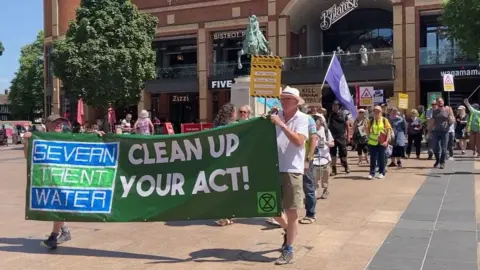Sewage protest at Severn Trent headquarters in Coventry
 BBC
BBCCampaigners left a bucket of fake sewage outside Severn Trent Water's headquarters in Coventry during a protest against pollution and leaks.
About 50 protesters marched from the city to the water supplier's offices in St Johns Street on Friday.
Organiser Merle Gering, who chairs Keep Our Green Belt Green, said people were outraged at sewage going into rivers.
Severn Trent said it understood people felt let down by water firms, adding it was taking action on the issue.
Leaflets left by campaigners cited reports that in 2020 the company dumped raw sewage into rivers for 500,000 hours - which is allowed under government rules but has been criticised by water charities, the Local Democracy Reporting Service (LDRS) said.
It is an issue that has seen water suppliers across England come under fire.
'More to do'
Demonstrators in Coventry on Friday highlighted the pay of Severn Trent boss Liv Garfield, which came to almost £4m last year.
They also called for improvements to the firm's holding capacity at treatment works, to prevent overspills.
David Whiting, from Worcestershire, said the River Severn near to him was affected by river pollution, including raw sewage.
"What they need to do is start using the funds they have to invest in appropriate infrastructure so they can put a halt to the sewage discharges," he said.
Campaigners in Shropshire and Herefordshire have been particularly vocal on the issue in recent months.
There are more than 10 combined sewer overflows in the loop of the River Severn around Shrewsbury - one of them discharged sewage for the equivalent of 108 days non stop in 2022.
A Severn Trent spokesperson said: "We fully respect the right to peacefully protest and understand why people feel let down by water companies when it comes to rivers.
"We know what needs to be done to make it right, and we're doing it.
"We're delivering an industry-leading plan that includes bold commitments, such as by 2030 our operations will cause no harm to rivers.
"In the first year of this plan, we've reduced our impact by a third, but we know there's more to do, which is why we're continuing to invest hundreds of millions of pounds into making rivers the healthiest they can be."

Follow BBC West Midlands on Facebook, Twitter and Instagram. Send your story ideas to: newsonline.westmidlands@bbc.co.uk